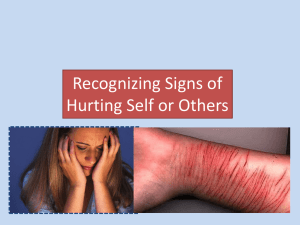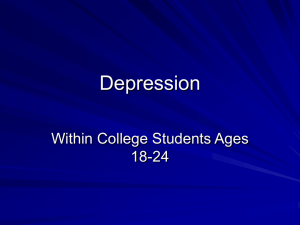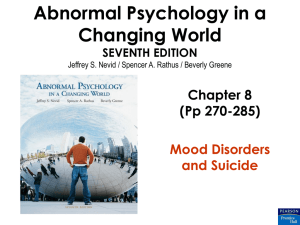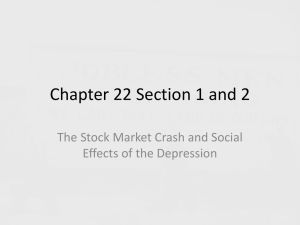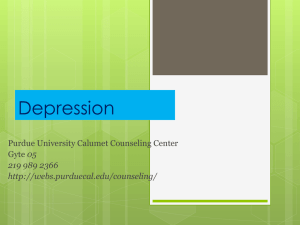Depression Centers of Excellence
advertisement
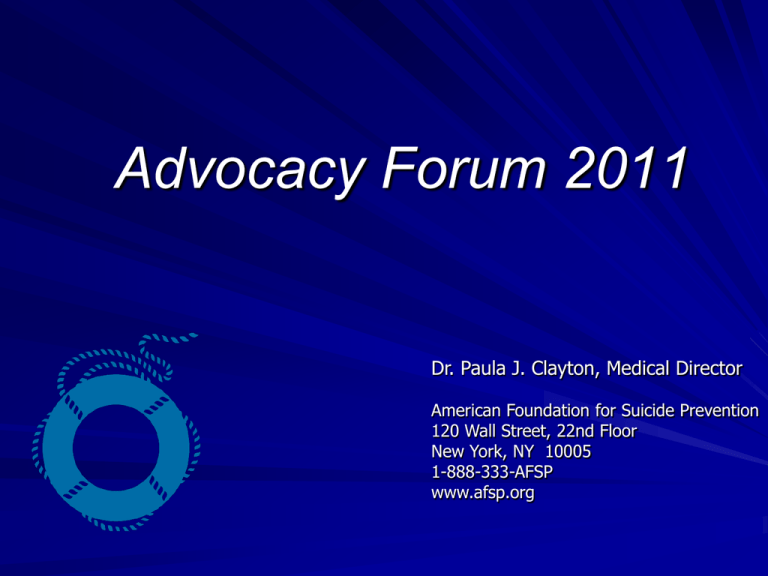
Advocacy Forum 2011 Dr. Paula J. Clayton, Medical Director American Foundation for Suicide Prevention 120 Wall Street, 22nd Floor New York, NY 10005 1-888-333-AFSP www.afsp.org Facts about Suicide Facts More than 34,598 people in the United States died by suicide in 2007. About every 15 minutes someone in this country intentionally ends his/her life. Although the suicide rate fell from 1992-1999, it was steady for 5 consecutive years despite all of our new treatments. The number of deaths rose by 955 in 2004, by 118 in 2005, by 663 in 2006 and rose even more, by 1298, in 2007. Although the rate in adolescents and the elderly is falling, alarmingly, the rate in middle age men and women (46-64) is rising. 3 U.S. Suicide Rates by Gender & Age (with special attention to those 65+) 45 Males 65+ 40 35 Male All Ages Rate per 100,000 30 Total 65+ 25 All Ages & Gender Female All Ages 20 15 10 Females 65+ 5 0 1993 1994 1995 1996 1997 1998 1999 2000 2001 2002 2003 2004 2005 2006 2007 Centers for Disease Control, WISQARS. http://www.cdc.gov/injury/wisqars/index.html Year 4 Prevention Prevention AWARENESS SCREENING EDUCATION MEANS RESTRICTION MEDIA GUIDELINES SIMPLE INTERVENTIONS TREATMENT 6 Awareness Primary risk factor for suicide is psychiatric illness: “depression can be lethal” Depression is treatable Destigmatize the illness Destigmatize the treatment Encourage help-seeking behaviors and continuation of treatment Proposed: Billboard campaign AFSP: Depression and Bipolar Awareness: From Diagnosis to Remission Civnar, JG, Perspectives in Psychiatric Care, 2005 7 Professional Education One of 3 Studies In the Swedish county of Jämtland the use of antidepressants in 1994 was 25% below the Swedish average and the average suicide rate during 1970-1994 was 10% above the national average. From 1995 to 2005, GPs were offered a two day seminar on treating depression which consisted of lectures, case discussions, and videotape presentations. There was an option to continue one day seminars in future years. Suicide rates per 100,000 1974-1994 1995-2002 Jämtland 27.7 17.3 Sweden 25.0 17.6 Decrease seen mostly in women Henriksson S, Isacsson G, Acta Psychiatr Scand, 2006 8 Professional Education Sales of antidepressants in Jämtland, Sweden 9 Suicide Prevention Strategies: A Systematic Review (2005) Intervention Education Public Primary care physician Gatekeeper US Airforce Norwegian Army Increasing antidepressant prescriptions* Chain of care Restricting lethal means Guns Domestic gas Barbiturates Vehicle emissions Analgesics Media blackouts Suicides, % Decline in Annual Rates Not available 22-73 40 33 3.2 Not available 1.5-9.5 19-33 23 Not available Not available Not available *There was a 414% increase in antidepressant prescriptions 1987 – 1999 Mann J, et al, JAMA, 2005 10 Treatment and Dissemination National Network of Depression Centers 2929 Plymouth Rd., Suite 300 Ann Arbor, MI 48105 www.nndc.org Purpose NNDC’s Mission To conquer depressions, bipolar illnesses and related diseases so millions can live better lives by developing, disseminating and translating standardized, sustainable, evidence-based, large-sample research advances into clinical care via a national network Four INTEGRATED domains 4/8/2015 Research Translation Clinical Care Education of a New Generation Public Policy 12 Timeline and Progress Center of Excellence Membership The nation’s leaders in depression & bipolar care, research and education 1. 2. 3. 4. Columbia University Duke University Emory University Brigham & Women’s Hospital, Partners Healthcare & Harvard 5. Johns Hopkins University 6. Massachusetts General Hospital, Partners Healthcare & Harvard 7. McLean Hospital, Partners Healthcare & Harvard 8. Stanford University 9. University of California Los Angeles 10. University of California San Francisco Depression Center 4/8/2015 11. University of Cincinnati & Lindner Center of HOPE 12. University of Colorado Denver Depression Center 13. University of Iowa 14. University of Louisville Depression Center 15. University of Michigan Depression Center 16. University of Pennsylvania 17. University of Texas Southwestern Medical Center 18. Weill Cornell Medical College 14 Vision and Roadmap Our Clinical Reach Patients Treated Annually • Outpatient ~ 526,000 • Inpatients ~ 29,000 Current Staffing • Clinical Psychiatrists ~ 1,000+ • Clinical Psychologists – 336 • Social Workers – 300 • Nurses – 600 Current Facilities • Inpatient Beds – 1023+ • Child/Adolescent Beds – 276+ • 1028+ treatment rooms available for adult outpatient • 298+ treatment rooms available for child/adolescent outpatient 4/8/2015 16 Committees & Task Groups Over 400 individual members from multiple disciplines participating Domain Committees • Clinical Care • Research • Education • Public Policy Task Groups Underway • Women & Mood Disorders • Child & Adolescent Mood Disorders • Primary Care Outreach • Bipolar Disorder • Suicide Prevention • rTMS (repetitive Transcranial Magnetic Stimulation) • Health Services & Intervention Dissemination • Biosignatures & Pharmacogenetics • Electroconvulsive Therapy • Geriatric Depression & Bipolar School-Community Depression & Suicide Prevention • College Mental Health • 4/8/2015 17 Board of Directors Officers Founding Chair: John F. Greden, M.D., University of Michigan Depression Center Vice Chair: J. Raymond DePaulo, Jr., M.D., Johns Hopkins University Treasurer: Frank deGruy, M.D., M.S.F.W., University of Colorado Denver Depression Center Secretary: Terence Ketter, M.D., Stanford University 4/8/2015 *The NNDC Executive Committee includes members who are starred (*), in addition to officers. 18 Selected Projects Research & Clinical Care • Common Assessment Package: providing standardized • Women & Mood Disorders Registry, Database, & Pending Clinical Trial (10 member sites) Bipolar Genetic Repository (6 sites) rTMS Dose Enhancement/Outcome Project & communication with FDA (14 sites) Intervention Dissemination Task Group for Evidence-Based Chronic Care For Bipolar Disorders (8 sites) NNDC Data Coordinating Center (DaCC) NNDC Data Registry Joint research recruitment program with DBSA • • • • • • assessments for depression (“vital signs” of Psychiatry) 4/8/2015 20 Collaborative Grant Projects or Submissions Involving NNDC Centers • EMBARC (Establishing Moderators/Mediators for a Biosignature of Antidepressant Respeonse in Clinical Care) – NIMH-funded U-01 (contract) involving Columbia, Michigan, UT Southwestern, and Mass General-Funded • RAPID (Rapidly Acting Treatments for Treatment Resistant Depression ); NIMH-funded U01 to develop truly innovative treatments capable of improving Treatment Resistant Depression within 72 hoursSubmitted 4/8/2015 21 Education and Public Policy Education Moodbook – a clearinghouse providing up-to-date, evidence-based information on mood disorders Adolescent Depression Awareness Program (ADAP) College Mental Health Task Force Public Policy White Paper produced for U.S. Senate Consultation with U.S. Senator to write legislation Support funding for the ENHANCED Act Position Statements from the NNDC 4/8/2015 22


